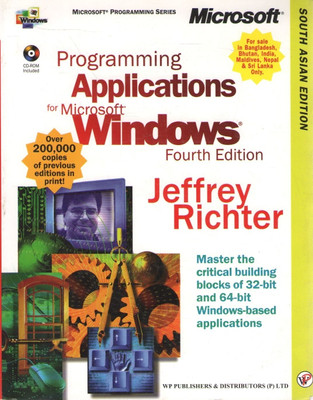Microsoft Programming Applications for Windows 4e,Richter(English, Paperback, Ron Soukup)
Quick Overview
Product Price Comparison
Here's definitive instruction for advancing the next generation of Windows-based applications-faster, sleeker, and more potent than ever! This fully updated expansion of the best-selling Advanced Windows digs even deeper into the advanced features and state-of-the-art techniques you can exploit for more robust Windows development - including authoritative insights on the Windows 2000 operating system. Coverage includes: Understanding Windows 2000 featuresŌĆösuch as jobs, thread- pooling APIs, Address Windowing extensions, Tool help functions, and sparse files. Mastering DLL basics and applying advanced techniquesŌĆö including API hooking, DLL Injection, function forwarders, delay loading, redirection, rebasing. and binding. Solving common thread-synchronization problems with a toolkit of packaged, reusable code. Building high-performance, scalable applications by understanding data alignment, cache-line boundaries, cross- process critical sections, NUMA architectures, and processor affinity. Using structured exception handling to create memory- efficient applications. Transitioning to 64-bit developmentŌĆösee what's ahead by studying a full cache of code built and tested on Windows 2000. Two hundred thousand developersŌĆöand countingŌĆöhave advanced their expertise with Windows under author Jeffrey Richter's skillful tutelage. Packed now with even more expertly rendered examples and pragmatic insights, PROGRAMMING APPLICATIONS FOR MICROSOFT WINDOWS, Fourth Edition, extends this legacy to a new generation of developersŌĆöand the next generation of Windows. Included on CD-ROMŌĆöE-Book Plus Code Samples You get source code and executables for all sample programs and utilities, including: ProcessInfoŌĆöshows which processes are running on the system and which DLLs are being used by that module. VMMapŌĆöshows memory usage in an address space SysinfoŌĆöprovides architecture information about the host machine VMStatŌĆöindicates system memory usage DIPSŌĆöDesktop Icon Position Saver USWatchŌĆömonitors systemwide and thread-specific window input changes Plus a fully searchable electronic version of the book. For System Requirements, see the introduction page. About the Author Jeffrey Richter is a well-known author, consultant, and trainer in the field of Windows programming. He writes the Win32 Q&A column for Microsoft Systems Journal and serves as a contributing editor. Jeff has been a consultant to many companies, including Microsoft, Intel, and Dream Works Interactive, and he regularly teaches on site Windows programming courses at major corporations worldwide.


